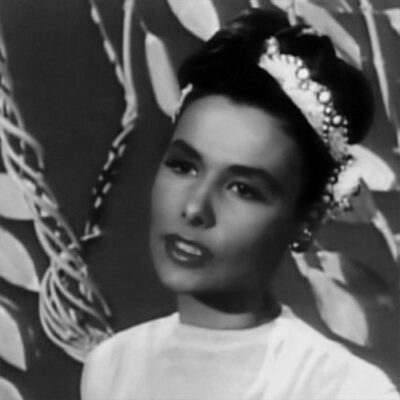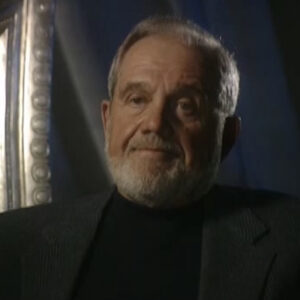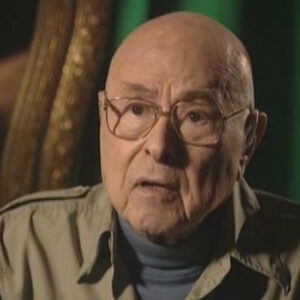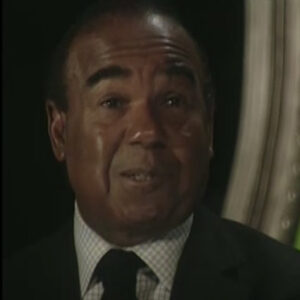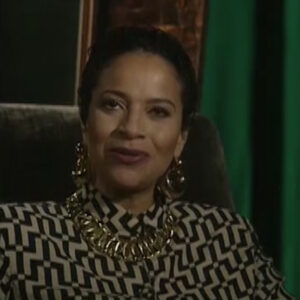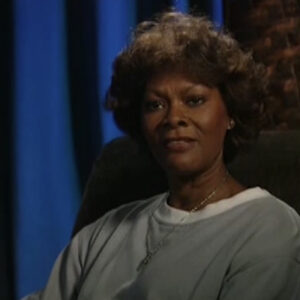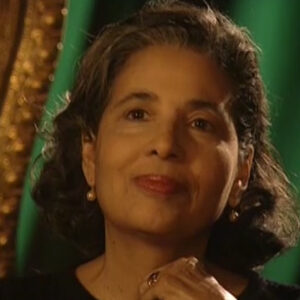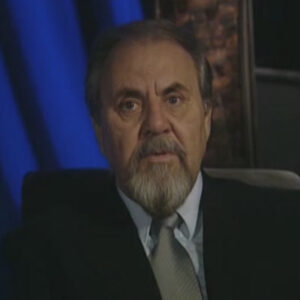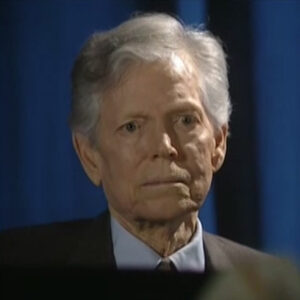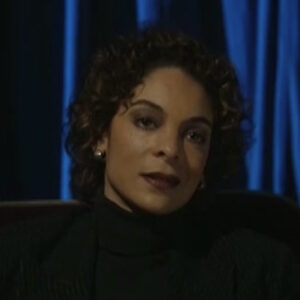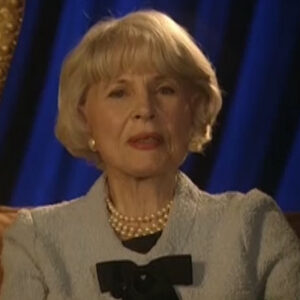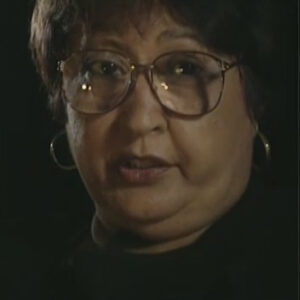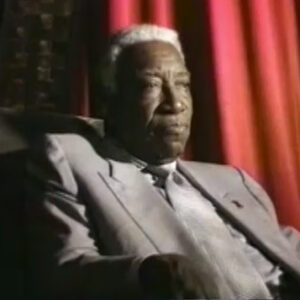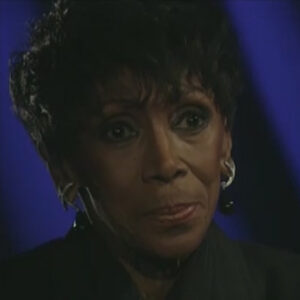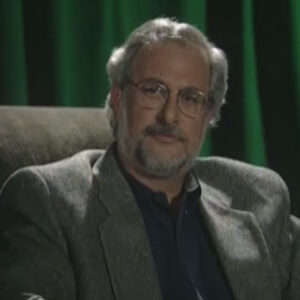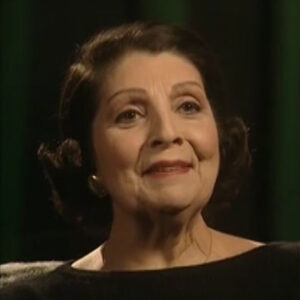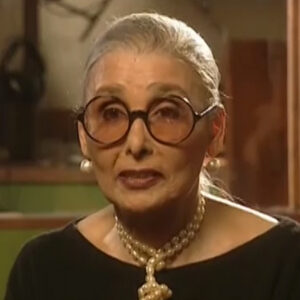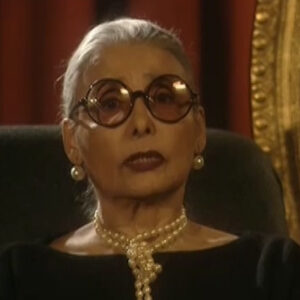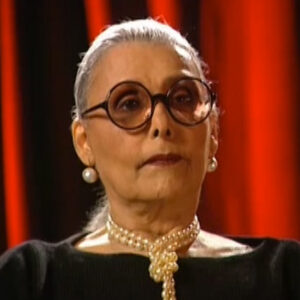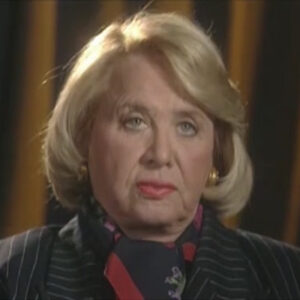Speaker What I remember is, of course, this was the first big engagement that we had after I had joined here, and at that time, as you probably know, the big nightclubs, the Copacabana, Cotton Club and so forth, never had black patrons there. They can’t control was always white. And one of the conditions that Lena Horne had imposed in her contract was that they should admit black people to Kofa. And so we prepared a opening, which is based on a song by Duke Ellington called Jump for Joy. I don’t know if I can remember. I certainly can’t remember what happened. But the opening lines I remember very well because we had a big fanfare at the beginning. And after the fanfare she did stop and she started out with this as if I can fake it a little because it’s like she may be coming down the stairs now like this.
Speaker You know, she has a big pause and she says, we’re so tired of the Southland that way down south in the mouth.
Speaker For all of these years, we’ve been bored to tears with the blues.
Speaker Well, I can’t remember a thing, but generally it’s like that. And I think the audience was very, very apprehensive. They didn’t know what this lady was going to do at that time anyway. She finally made it OK, because by the time the verse is over and you’ve gotten to the gospel type fare, well, that.
Speaker So let’s jump for joy. I can play all the stuff. That’s what you’re talking about, right?
Speaker Yeah, well.
Speaker Our family, let me tell you about it, just OK. OK, go ahead. You want me to tell you about the cover?
Speaker Well, as as we as we as you know, this was the my first engagement with her and I think this is the first time that the Copacabana had no maybe not that the first time it had back before with the people that I was at, but had, as I understood in her contract, that she wouldn’t perform unless there were black people in the audience and allowed to come in and pay the money to hear it, as is quite unusual at the time.
Speaker As you know, in 1947, the, you know, civil rights and so forth had to come in. And so there was quite a thing about that.
Speaker And so the song that was chosen that we chose to open up was being called Jump for Joy from a play by the same name by Ellington.
Speaker And it’s a unique verse because it starts out with well, I put it this way, I’ll try to remember I’m not trying to remember making up something now, but he was a big fanfares where you would come on with, you know, in Horne horns or drums and so forth going.
Speaker And I say.
Speaker And she would wait and she’d say, we’re so tired of the south land that way down south in the mouth land, for all these years we’ve been bored to tears with the blues and so on, like this had been on that vein.
Speaker And of course, the audience was, I think, quite transfixed about it.
Speaker And fortunately, it goes and sort of it gives them into, you know, into this little skiff will beat, you know, what the well and the cotton cotton flowers out of style.
Speaker I can’t play. You know, this is the kind of thing it was. And it was really quite exciting. I don’t know what else about that opening.
Speaker Uh, well, uh, no, I’m jumping for Joy first came out in response to and and at the Copa.
Speaker Well, yes, it was it was kind of I, I seem to remember kind of you can feel it more than they did. People kind of wondering whether, you know, what are we going on slave ship here, what’s going on?
Speaker You know, they didn’t know, but it was it was done perfectly because it was like hitting on the square, you know, and which.
Speaker I said, I think only Alayna at that time could have brought us the way she did. So let’s talk about.
Speaker Leona.
Speaker Uh, uh, she was the biggest star going back, and, uh, she she was doing movies at the time, uh, of course they weren’t.
Speaker The movies weren’t the parts that she won. She always said she did. Then she should have gotten Pinki. I think she did that one time because she would have been able to know that role.
Speaker But the fact is that she was the number one that at the time and, um, so far as I was going for me, uh.
Speaker This is it was the pinnacle of my at that time young career, and that’s who she was. Uh.
Speaker You can just work for me.
Speaker How you how did I get through? Well well, it goes back, I guess that in a way speaking, I guess that everything I’ve done hinges it sort of reverberates back to Alison and I were high school kids who went to school together.
Speaker And and I got interested in music. I would hang out with them. And and I graduated from from Juilliard.
Speaker I wanted nothing more than to write for Allison’s band. Right. All those great musicians. Anyway, the point is he and Strayhorn were trying to take me under their wing pretty well. And they, uh, when I got out of the Army, out of the Navy, rather, they recommended me to Lena to. To be her and and conductor for her tours. That’s how I got my, you know.
Speaker When?
Speaker Oh, yes.
Speaker Yeah, what can I tell you, you can I when there’s a simpatico between people, you can always tell. You don’t have to say much too much.
Speaker It’s just that they they they were very tight. What can I tell you? Uh.
Speaker What was unusual about his music by strange music? Oh, well, what I think is I knew just kind of in a way, I think it’s technical and not. He is his lyrics. Of course he is. He was hired as a lyricist, as you probably know. But his music is very.
Speaker He does he he’s he’s he’s intimate, he’s very intimate with his music, his changes are not necessarily his is harmonies are not exactly the way that you would think they would be in the, uh. They’re interesting.
Speaker I don’t know what can I tell you that his loss of life, for instance, I don’t know if Lina did that or not. But anyway, it’s you know.
Speaker Nobody does that. So he’s making a play on ba ba ba ba ba ba.
Speaker He makes a play on this this this little change and he makes it. That’s the way you have to do it. You know what I mean? It that’s, I think one of the interesting things.
Speaker Otherwise, I mean, he exhibited so much soul and so much compassion for life.
Speaker And I can say I loved him too. I mean, everybody loves Sweetpea. And I’m sure that that was a great part of the attraction for, uh, for for Lena also. And he’s a great musician, you know, wonderful churney musician that’s always attracted. Why, what I think that that was part of what they what they shared together.
Speaker Is a great musician, too.
Speaker She may not tell you that she is, but she is she’s innately a one of the one of the best musicians that avenue, because she she is everything she hears, all changes. And and not just dramatic content, but she does great. But I think that was a bond between them as well because of the the the the parallelism of their expression.
Speaker And I guess that’s about I don’t know what else I can tell you, but I was just.
Speaker Between them to say, I think that was the bond between Lena and Billy Strayhorn, their parallel.
Speaker You want me to say that again?
Speaker That they express that the same way you said, but put their names. So what did I say when you said you thought that was a bond between the.
Speaker Oh, yes. OK, so you want me to say that again? Yes, I feel that that was a bond between them, their parallel feelings about music and the expression between Billy and Lena.
Speaker Uh, and I think that’s what was a big, big bond, but.
Speaker Oh, I see, now, how am I going to tell you this, Linnehan a. When I make up my resume, I’m often tempted. To put under education, you know, city college.
Speaker The Juilliard School of Music, Duke Ellington and Lena Horne.
Speaker Why the education?
Speaker Because I think that in retrospect, I can tell you that Lena Horne represented the kind of expression of a is like a force of nature, which is what we all at, which we all try to do. We are we are implements and tools of of nature.
Speaker We are expressing we express it through ourselves.
Speaker And she demonstrated how how what complete contact with what intimate contact she could have by simply being to her expression, which she was never I think she never, never had that she had truth.
Speaker And I think that other people, I guess, go to acting school and so forth for that.
Speaker I learned really that it.
Speaker That issue is that that the popular that singing is intensified speech and that Lena Horne was able to do it.
Speaker Really much better than anyone, you know, having a little trouble, can I have a drink?
Speaker Yeah, yeah.
Speaker Are we still on this? So I’m going to tell you, are we can we trust this woman? I’m not sure that I’m comfortable giving you I’m not too sure I’m giving you what you’re asking for, because I don’t I’m I’m feeling like unscripted. But yes, I feel that I am scripted and I’m not sure that I’m coming off well.
Speaker Well, I’ll tell you what you just said about. What they can do is bring intensified speech is exactly what I’m looking for, because I’m looking for the things that really make her unique and really express. The artist is and why?
Speaker Yeah, this is hard, you know, if I could, you know, I don’t know if you could we’re not on our way. Well, the thing is, if we could discuss it like we did on on the phone, that that that you need me to be closer to you.
Speaker Well, I. Well, not necessarily. It’s just that that. You stage a few little staged, I guess that’s what it is, but I don’t I’m not talking I find that I’m not talking as crazy as I did on the phone. Right. Do you not feel that?
Speaker Yeah, I do feel that. Feel that.
Speaker Which is why I’m wondering if it would be better if I were closer to you.
Speaker You have more contact with me or.
Speaker Is to just keep going?
Speaker Yeah, well, that would be fine if I could do that. Yes.
Speaker And and one of the reasons essentially that I think because I have so many things about Lena, you know, she is she is a great person. And this is what I’m talking to you right now, is the way I can talk.
Speaker And we really we just thought, OK, well, the thing is that you’re interviewing me about Lena Horne.
Speaker And it’s it’s something it’s she is is a pivotal point in my life.
Speaker And in retrospect, I have to say that she’s she represents the kind of of artistic contact. You know, art is communication. She represents a kind of communication that is primal, not primitive, primal kind of communication, which permeates all great artists.
Speaker And she’s kind of it’s like a force of nature. You know, we we we we channel the forces of nature for our own good. We think that we direct them and so forth. And truth of the matter is that the continuum goes on. And so we are able to express that continuum more freely and more directly than others. And Lena is one of those that is forcing this is like a waterfall is a force of nature, you know, a force. It is is it is something that we we deal with actually channeled it and so forth.
Speaker But the the the the, you know, channeling it and making it come out like a waterfall or like a like a, you know, a fountain or something like that.
Speaker This is an this is the expression Lena does this. I don’t know how she does it. I’m not sure she knows how she does it, but she makes that kind of contact and being with her and in bed, her one must join into that, must join into it.
Speaker And that’s an experience that’s an experience that I’m sure everyone hasn’t had. And I did. And whether she knew it or not, unwittingly, she just taught me how to do that.
Speaker And I don’t know how else she taught me.
Speaker And maybe I have forgotten. But this is what I think about her artistry. It’s like.
Speaker It’s unlike I put it this way, the the the artistry of of of of. That that stems from a European point of view or perspective.
Speaker Well, I need to explain. I don’t know the music that we do here in America.
Speaker What we are what we are right is derived from Afrocentric and Eurocentric things. They’ve they’ve combined together to form what we call our American music, whether it’s jazz or whether it’s the pops and so forth.
Speaker And the the expression, the the primal play, the folk expression from which all these things that is the force of nature which comes out of whoever the performers are and when when it comes out in such force and with such clarity, then we say, oh, that, you know, this is a Lena Horne, this is a Horowitz, this is who I am.
Speaker Hey, whoever. You know what I mean?
Speaker And I think the experience of being with that for three years or more taught me well, I think when I left, I thought I knew enough to set myself up on Broadway as a coach and a pretty good coach, too, but.
Speaker That’s I don’t know if I’m going off on a tangent about it, is something that that I got from her, I don’t know.
Speaker She knows that that’s what what she gave me.
Speaker But that plus, which she is a very intelligent, bright and caring woman and she has a, you know, of concern about our social welfare and stuff like that.
Speaker But I think you’re going to long without asking me a question that people ask.
Speaker What is it that you learned from her about lyrics about?
Speaker Lyrics, I think, lyrics, they are the essence of any song, the lyric rides on the on the wings of the music, the lyric is the essence of of of any song.
Speaker And I kind of feel that if.
Speaker Particularly with Lena, if if she is, there isn’t there isn’t a she can’t make a true statement, that is true and true to her that she can express.
Speaker I don’t think she would do it. You know what I mean? I don’t think that. I think that.
Speaker Uh.
Speaker The the the ability to deal with the lyric, with your own personal your own specific point of view, your own specific feelings of this is what she does. Frank Sinatra did it.
Speaker I mean, actual any great any great performer. But every scene from that. And I think it has to do with with truth.
Speaker If you if if you’re if if you’re trying to to flimflamming that and not really don’t really mean what you say.
Speaker I don’t have a list as a subplot which you know, could be anything, you know, you could just hate the idea of having to be up there and having to be being like with them being a woman, being being black and maybe being a mixed heritage and so forth, maybe that maybe there’s a certain amount of anger that goes on.
Speaker And so why is everybody like this? So she says, look, like we’re so tired of the south and we’re down south.
Speaker And my hair really has a lot of meaning, you know, because it’s if she feels that deeply, it comes out and that’s. I think something that every performer has to has to aspire to, and she just comes by it naturally.
Speaker Most of us have to try to learn it in different ways, you know, at the.
Speaker Now to Paris, what about Paris?
Speaker Yes, well, what was the most notable event, Paris?
Speaker That was when I asked. I think I had one engagement with her first, and then we went to Paris. Is she in? And I met a tiny tiny with her companion. And that was a wonderful experience.
Speaker I mean, she’s, uh. And we, uh.
Speaker What do I remember about it? I remember negotiating, I remember negotiating a taxi trip, we came over from London to Calais and in Calais, as I remember, they first they were with a great general general strike.
Speaker Understand they’re still having strikes. That’s what they do, you know.
Speaker But in anyway, we got to fly late and there’s no trains running.
Speaker And then my little high school, French, college, French and so forth, I very proudly negotiated a cab ride from. From Calais to Paris, and I thought, oh, I don’t know that that he said he did forsake me from those tent means, you know, five. And I think that when we got there, there was a big commotion at the hotel because evidently I had I had you wrong. He really wanted charge me from, you know, Sincock from something, but certainly not not 5000 francs.
Speaker So that was kind of a funny episode.
Speaker And what else turned up that where Lena and Lenny were married in Paris?
Speaker I was a witness to their wedding, and that was a.
Speaker They always, always, you know, they just go into a it’s like the prefecture, you know, it’s not a great ceremony, anything like that.
Speaker Let me stop you for a moment and go back. I need you say when I got there. I need you to add that in.
Speaker How do I do that? When we got married, you know, we just went to a private school. Oh, OK. All right. Well, before we let the people know, OK. Go ahead.
Speaker Uh, well, when leaning, leaning, leaning got married, it was a perfect choice and no great big ceremony about it and.
Speaker What else can I tell you?
Speaker And how did you how did you feel it was, you know, they were going to get married and you see, I don’t think I did.
Speaker But, you know, it was kind of I mean, we knew that she’d been there. They were together, you know, before I joined them, you know, and.
Speaker Why does it have to get you in trouble?
Speaker Well, they did because I don’t know. I really believe it or not, I get it. Well, I never really involved myself with personal affairs much at all. I thought that I just didn’t feel comfortable doing that. So that’s why I probably know less than people think that, too, about the whole to with. No, I don’t guess I’m trying to remember. Remember, we’re talking 50 years ago, so I don’t know if I remember everything correctly. That was a surprise. I don’t remember. I don’t think so. I don’t think so.
Speaker Uh.
Speaker I think this is a very simple, very simple ceremony and, uh, as I remember it, and then a celebration afterwards. I don’t remember the names of the people that she would know she would. She’s probably will tell you about it when you get you have all these things, you know.
Speaker But I’m not a real.
Speaker In response to this time, when leaders say the momentum of. Oh, yes. You tell.
Speaker Yes, and this was at the Copa, again, with that, you know, at the Copacabana, if I’m not mistaken, I think we say the six or eight weeks and we did I believe we did three shows and I’m not sure about that. But I think that it was it certainly these two shows.
Speaker But but we did seven days a week and it was a long, very successful engagement and so forth. And the proprietor was a fellow named Jack and Trada, and he’s big, big, hulking, six foot, some odd person and so forth.
Speaker And about this contact and say that we would she would do certain ballots just with Tian’anmen voice. And one was the man I love. Now, I don’t know. I think it might have been on closing night or at this particular time we did whatever numbers have done. We got up to code section. And the man I love now, it was.
Speaker She said she did it in such a wonderful way, as she usually does, but I find that when I had finished it was they the audience seemed to be just transfixed.
Speaker It was like a, you know, a beat one to to watch something like that and nothing.
Speaker And all of a sudden everybody just exploded. And I looked up and there was Jack and Trotter standing on the stage, wiping tears out of his eyes. And I was smiling, beaming. I was enjoying it a lot, too. And I remember that. And then turned around after a while and she said, You can start the next number now, Luther. OK, I hope it’s an experience of having that kind of reaction.
Speaker I think that, again, that you don’t get very often this was a you know.
Speaker What was Labor’s attitude about the.
Speaker No, as a matter of fact, she was very I think that she was one of the few performers in the never, never mix with the audience. In other words, sometimes, you know, the proprietors of the clubs you would normally expect to be performing. They have, you know, just the celebrities they want. The performers would come out and said, have a drink. But she would never do if she stayed in a dressing room.
Speaker I think that she just wanted didn’t didn’t just wanted to keep that image that she was, you know, there.
Speaker And she was she was going and she was beautiful and she was sensuous. And, you know, in your eyes may shine, but teeth make good. But nonetheless, you get, you know, with that attitude.
Speaker And it worked for her.
Speaker And I I don’t know whether that may have been one of the big things that that that did work for her a lot and.
Speaker Subsequently, when we did the show, they now have music which I collaborated with or helped her on, I think by that time she had and decided to just drop this facade and let her her own self.
Speaker I don’t know whether she was ever maybe she might have been afraid to really just let myself go, but not at that particular time.
Speaker I think she just decided, well, she’s just going to let it all hang out and so forth. And of course, all of the technique, all of the things that she knew how to do. She had done about how she projected. And so far, none of that went away. It was even more stirring. So that, again, was a you know, as you probably will see whenever you say she’s it’s an electric, almost emotional experience that, you know, I was going to say religious experience, she said, has that effect.
Speaker And I think that that that, uh, that’s what’s so wonderful about her.
Speaker Um, I don’t know. I dismiss them all the way and.
Speaker There were some really powerful members in the.
Speaker Oh, yeah. How did they get back to you?
Speaker Well, I I happened to have been.
Speaker At the time, I remember correctly, as I was before it happened, I was in Paris with the, uh, Ain’t Misbehavin show that I had done and I was playing with that.
Speaker And we went to London.
Speaker Uh, uh, I was calling my wife and I met her in London and then I was playing at this warehouse at the play and not to play a very great event to see her.
Speaker And I wasn’t sure that, you know, there’d been a long time since I’d seen it. I didn’t always go backstage because, you know, I don’t like to be forceful and all that sort of thing, but we decided to go back and say hello and how much we enjoy the show.
Speaker And her manager said, oh, there you are. We’ve been looking for you all. So what? Why you didn’t call me?
Speaker The point is that that’s when they they they asked me to help with the with the show, which which I did.
Speaker How did it happen with, I guess, proud to try to make up a book with different different authors and so forth. And as I remember it, I finally just turned out that Lena and.
Speaker Uh, I’m not sure what I can call a match, his name is Sherman Whack, I can tell by the chairman and I and with that said, the needle and his office.
Speaker And we talked about how to be how we should how it should be and what we should what numbers we should take. And I went home, wrote out an outline and wrote that kind of a thing of it.
Speaker And that’s how it came about. And it’s a collaborative effort.
Speaker And in principle, we talk about how it should be. What was it you were looking for? What were you trying to.
Speaker I’ve worked with. You’re not trying. What you’re trying to do is to follow and to present, however, is not to be is not to be pinned.
Speaker And she’s not to be almost I was going to say not to be direct if she’s to be followed.
Speaker But the following that you do must be with the sense that you are also direct and it has to be organized. And I think that that what we wanted to do and what she wanted to do was exactly what we are doing, which is that now she she wants to present a new line, I thought. And boy, she certainly did. And it was.
Speaker You know, I feel the tension because I’m I’m looking at it as though, you know, what I’m seeing and I think, my God is such a fantastic thing that she doesn’t I’m, you know, privileged to be.
Speaker Be a part of it is the way I feel about it. But what are we looking for a. I guess that’s about it.
Speaker Whatever you got to say, this is the way it is, is the way I am. I love you and I hope you love me. And if you don’t, you don’t. Well, let’s do the best we can. You know.
Speaker That’s what I think.
Speaker When you were musical director back in the 40s, yeah, what you say about it. What what was the common denominator? What kinds of material were you looking for?
Speaker Well, to MacRobert, right, uh, uh, what do you use for songs about that that have some meaning ballads, talk about love, I guess?
Speaker Yeah, the greatest search always has been for openers, you know, opening tunes and and also to the what you call the showstoppers. Was it show style? Was did I do at the time, I guess you still may maybe still think it was a Fillmore had done an arrangement for her I think on that before. And we took it and we would try to do it and she still does it. And definitely we were looking, I think forever for a replacement for that and for a stormy weather. All of the things that people get identified with, that’s those are some of the things that we look for. We looked for songs that that had had meaning and expressing, you know.
Speaker Yeah.
Speaker And thought I mean, uh, you know, uh, you know, the, um, doing, you know, hey, diddle diddle or whatever the song is not would not be just for her unless she was going to make some some, some, some sort of like I feel so snooty, you know, is a kind of where I think of that. But now this is this would be different. I mean, you know, Betty Boop would sing I feel so smokey too, but she wouldn’t do it like Leona does. It sounds like it sounds different because there is the truth of Lena in that. And so what we looked for, though, I would think and what you want, but things that would would make a contact, that would have something to say and that hopefully with the I would have some sort of contour in terms of presentation, beginning exposition and then like that.
Speaker Oh, look, I remember I don’t remember it. No, I don’t you know, I do remember, but I’m not very good at demonstrating, you know, as you probably saw before.
Speaker I’m letting other people do it.
Speaker But, uh, uh.
Speaker And then a few things that you would say to me.
Speaker Warren.
Speaker I think it is a force of nature. I don’t know of any way to say it, she is that and she is to be dealt with as if you can’t do that. I think that you can’t serve her. I think she needs to be. And that needs to be I mean, we want to it needs to be served on those terms and.
Speaker Uh.
Speaker The intensity that she has is what you see, I don’t know how to describe it other than that.
Speaker Well, of course, but so that’s that’s that’s more to be thought of as a compliment than it’s a it’s not it’s not a democracy.
Speaker Of course she’s a hard taskmaster because she is not going to do anything other than the best that she has, is not going to do anything mediocre or anything like that.
Speaker She can’t you know, the world the world thrives on mediocrity. I shouldn’t make this kind of statement. But the fact is that in many instances, particularly in a lot of our pop culture and so forth, that is the order of the day that we know we’re thinking of.
Speaker You know, you don’t have to do anything but just dot, dot, dot, dot, just like the rock and roll and so forth. Yet.
Speaker Uh, uh. Uh oh, subquestion again.
Speaker Tell me if getting.
Speaker You took notes on me. What kind of notes did you take? I think I think your notes are better than what I’m telling you.
Speaker And I do this.
Speaker You know what? And you were telling me about.
Speaker You have people staying out of the way because staying out of the way, OK. Uh.
Speaker How do I. Well, you know, uh.
Speaker Unless the person is singing a cappella. Then it’s essentially a do it with one person who is the leader and the other is the follower. Now, a good follower generally anticipates where the leader is going so that the leader does not have to pull him. So the thing is that you have to you have to know the melody and you have to know the words.
Speaker If you say something, you know, someday he’ll come along. The man I love is in the middle of something. He comes along, you do a big river.
Speaker It takes away from whatever she’s going to do. You have to leave that. You have to have dramatic content to flow.
Speaker And what you need to do as an economist, I think, is to a bit, if you can, the dramatics of her lyric when we are doing things extemporaneously, I like in her as jazz and so forth.
Speaker This is the this is a bit of a, you know, an ensemble that’s been together a long time to be able to breathe and think again.
Speaker So therefore, when you improvise, you sort of help each other go along this route, you know, and.
Speaker At one point, I think that we had a trio with Chico Hamilton and Charlie Drayton and myself that was quite unique in that that we felt that we were.
Speaker Uh.
Speaker We were leading and following at the same time, and particularly and I can’t demonstrate this is but I mean, one comment at the Copacabana where we played so, you know, we did it like I know Honeysuckle Rose or something. It’s a very slow tempo, but or something like that.
Speaker The point is that when you’re keeping time, it’s it’s a pulse. But having a pulse is not necessarily metronomic.
Speaker And somehow I feel that we were able to do her cadences and to bring back her to feel feel the the back back timing with her and come back up without losing the pulse. And I don’t know exactly how that happened, but that seems to be what we did. And I remember one of the the drama the couple made a remark about one time. She’s you know, I just kind to see you guys. You don’t keep straight time as well, man.
Speaker What what is this? But again, in accompaniment.
Speaker What can I say, you simply have to I try at least to to, uh.
Speaker Involve myself and the dramatic motion.
Speaker That’s that’s in the.
Speaker To a veteran, and that being the case, you can’t be a soloist now, it’s quite different when you’re with like, for instance, it was really like a jazz singer like like great like Ella Fitzgerald or some of the some of the some of the attendees. The essence is that everybody is playing. Everybody’s jamming in the end.
Speaker And when they’re doing the licks that they’re playing, particularly if it’s enough to the essence is.
Speaker It’s not necessarily that kind of dramatic, it has to do with the exuberance of of, you know, taking the high hurdles together or stuff like that, you know, I can’t exactly explain, but but it’s a little different agenda.
Speaker It’s a little different thing. And it’s something that.
Speaker You know, again, you get a great ensemble in jazz and what I think Ellington’s is a good example, when they read the other one, they’re thinking together, you know, and his band didn’t always sound great. But I’ll tell you, when they did all of these these these fantastic musicians who were chosen for their own individual input, they managed to make Ellington managed to somehow make them come out with a cohesive whole that was just beyond comparison and.
Speaker I know, I guess they were really accompanying each other in a way that’s jazz, I guess jazz is folk music is to be joined. You do it together. Is it togetherness about that? About what? About the about artistic expression on the folk level. And I say that I mean, because that’s the only level. That’s the that’s the baseball. That’s that’s the primal level. That’s what that’s where everything is evolved from. That’s from European, African or whatever it all comes from that that’s primal urges. And I’m getting too far afield now because I don’t want to get into all that.
Speaker They always say I’m too I’m too too technical, you know, and all that stuff in Georgia will be one of the greatest accompanists.
Speaker Did you ever know he was an accomplice to say nothing of being extraordinary bassist?
Speaker Again, there was there was the he was.
Speaker Congeners to tame a word, I mean, but he love what he was doing, he loved doing it for Felina, for people, for anyone that was ready to join, that he could join with you later, did some some duets that were extraordinary.
Speaker And I think he’s just a vivia, probably. I was able to join that. That continuum that that Lenar set forth. As much or more than anybody else, in a way, he made also did it, but this is this is an extraordinary talent that George had and that he joined it, joined in it with, you know, and that was.
Speaker Wonderful, wonderful things to make family.
Speaker Well, they belong to her. Don’t you know what I mean? This is a part of the same thing, you understand? Because if you when you when you play for her, you belong to her. That comes out wrong. That’s wonderful. I don’t mean something that’s bad, but that’s that’s what what you do when you have a force of nature like that. Erin was also a force of nature. When you have that, that you belong to them, no matter whether that you that implementing or putting them forth and so forth and.
Speaker Uh, it is a family it has to be a part of, and if in any venture that does not have that a feeling of cooperation and and and and loving one another and having the same agenda and so forth, generally it doesn’t go too well, you know. And so but when you have a leader, you have someone who has that and you follow it, that’s the way you do it.
Speaker And I think that’s right. I think it’s the same in any walk of life.
Speaker People are people are followers and people are leaders as good, strong leader who has as as the the the the, uh, um, ability to project or to do this these these things is the, uh, is able to, uh, have people follow him, promote his agenda, promote his or her things as the case may be. And I guess I’m getting a little too far afield. This is we’re talking about art and communication and that kind of electric flow that goes between people and that should go between people.
Speaker That does go between people and our expression.
Speaker The people who are the wonderful artists performing are the ones who are able to to to to to convey that you embody it and are able to exude that and communicate to people.
Speaker They are the one the the great artists.
Speaker By one.
Speaker Yes, if you could rephrase that for.
Speaker Now, when you mention that again, because I’m not sure I understood what you said. We were you were telling me what you said was, you know, like, oh, yes, right, I understand what you mean. Well, no, what I meant was that it’s not. But I think it’s more prevalent. And I think the performer is always out front. And whether the composer is at their mercy in a way of speaking or maybe maybe vice versa, that they are.
Speaker But the point is, is the performer.
Speaker Who is is OUTFRONT now in a nightclub, the very, very physical things of it being a smaller space, there’s a more intimate contact and one cannot stand off and be aloof and just have have one watch you do your exhibition.
Speaker You have to join with them in a dialogue. And you and the audience have to come to it, make a transaction. You come to the table with a certain certain baggage, you know, are you and the and the audience have then you you have a transaction and it’s an intimate transaction. I think it’s different in a theater where you have more or less like a a wall.
Speaker I mean, the stage you’re in a stage setting and the spectators, you’re spectators and performers in a nightclub.
Speaker You’re you’re not spectators. You’re in it. You’re part of it, the audience.
Speaker And that’s why I think that there’s a different approach. One must be one must be willing to submit themselves to close scrutiny in a way.
Speaker What’s interesting, however, is that in larger venues, when you get into theater venue, I think also there is something about that projection that those who think that have that projection that can that can manage to get it across.
Speaker And there is this they have this is the same is the same Alexiev, but just it’s delivered in a little bit a different fashion, you know. How does that make your home answering a question?
Speaker I guess that’s why I don’t know.
Speaker And I just try to make sure these.
Speaker Well, could you believe it at all? Well, I’m going to tell you that that when you were talking about you’re doing a tribute to Lena Horne, right.
Speaker And I think that you you have to. I understand that you wouldn’t even be doing it if you and everybody else. I didn’t feel the magnitude of her of her presence as an artist and we’re trying to maybe analyze it and so forth, and maybe it can’t be analyzed.
Speaker Maybe it’s just got to be.
Speaker And experienced and unhappily so, uh, you know, that this is it, it is fitting that this should be a tribute to Lady Leonhart, because I think that she is unique, unique in the history of of entertainment and the history of music here in the United States.
Speaker And do you feel that she’s been up as a musician?
Speaker You said I don’t know that she’s ever been raised as a musician. I think she’s been an entertainer, performer and actress like that.
Speaker Is that how should I put it?
Speaker If we’re talking music in terms of does she scat like Ella Fitzgerald or like, you know, Mel Torme or whatever, she doesn’t do that, by the same token, means that they do what she does, do you know?
Speaker So I don’t know how you think there she is, at least as good a musician as any singer I’ve ever met, because whether she’s studied or knows how to write, I think she she certainly knows what we’re trying to learn. Remember songs, you know, that maybe you’re not written down or maybe trying to remember some changes from that.
Speaker Somebody said, oh, you play. And she says, no, that’s not it.
Speaker And she’ll she’ll know the harmonic values and can can can lead you into finding the correct things that the correct harmonic values, even though she’s not what you call transposition, she she knows that she has an innate ability to do that.
Speaker So, yes, she’s a fine musician. She may take some exception to that because she doesn’t think she is. But she’s she is.
Speaker What about Lenny, Lenny was a wonderful, wonderful man. I learned a lot from Lenny.
Speaker I think that he I think, first of all, I’m sure that that so far he personally is concerned. I’m sure he loves them very, very much and that he wanted to sit in that corner for everything. But so far as music is concerned, he he kind of you probably know he was the chief of the MGM music department and, of course, classically trained.
Speaker And he conducted a lot of the big shows and they kind of kind of of of lush things that you’d hear in the movies that, you know, in the movie soundtracks.
Speaker He wrote some things. But, you know, in he was as a conductor and as an arranger, but he had a concept of.
Speaker Of how should I say, of of the.
Speaker The combination of the European.
Speaker Tradition as applied to our quote unquote, American museums in the very short period and all of those movies, and I am just listening, watching it, not knowing a lot from him. And one of the things he taught me one at one time I was doing something new was and I was playing for and like this or whatever was very funny, says, listen to, you know, the melody.
Speaker And so, you know, I must say that what happens a lot of times in pop music that there certain you know, they’re very certain changes go, you know what, they’re not that many progressions. And once you many times you learn the chord progression before you learn the melody. And obviously, he taught me because I’m playing this progression and not evolving.
Speaker So therefore, Leonard wasn’t getting what he wanted from me, you know?
Speaker And so as soon as I learned since I just played the melody, then we did well.
Speaker So again, this is where you asked me about for you, right.
Speaker So this is a big portion, I think that. Different people, different singers require I can stand different amount of of dramatic input from their continent, you know, and, um, I like to get involved musically, musically.
Speaker Well, it’s interesting.
Speaker I think they got along actually, you know, I don’t know how to comment on that because he played for her sometimes and sometimes it’s a.
Speaker She would want me to play for. I think that they got along fine musically. I know what you said then. I said sometimes I thought that maybe in two, three to four. Totally.
Speaker I guess that’s that that’s a fair way to put it. Things, the flow of natural resources, let’s get down to that again, forces of nature, natural resources can be channeled in various ways and we meet and they come up and we use our intellect and abilities differently in channeling those forces.
Speaker Now, I say that I think that Lenno is more intellectual in terms of being being bright and wise and knowing, you know, and and understanding things than than I am certainly maybe more than but I would would would always want to analyze and put in and and and then synthesize and so forth.
Speaker I think that Lenny and I both did this in a certain sense.
Speaker And whereas Lena, I think really appreciated it and wanted this and felt that it was good that often she couldn’t tolerate it because she is the leader.
Speaker Do you understand? She would she it would have to be that way. She would have to be the leader. And that’s as it should be. And when it gets to be too special or too intricate, I think that that throws her flow.
Speaker And therefore it doesn’t. It doesn’t. So therefore, we work quite hard.
Speaker We would be quite a lot, you know, until the of it in in this and in this combination, I think we both got something out of it.
Speaker I think that that that, uh, many times that that.
Speaker That unit, the unit that trying to make sense of what created the energy that might have projected even a greater expression and cerebral.
Speaker She’s also quick. No way. All right, Billy was also quick and.
Speaker And most of the time, very correct and right on the button and I get to it 15 years later, you see, and that’s that’s terrible against, you know, inspirational or whatever the other word might be.
Speaker So when I say that, if I may have been disagreeable, this is not a this means that there just was a difference and that it had to be recognized. And I think it was recognized and I think it is recognized then and and.
Speaker When I did work, when you when you started.
Speaker Yeah, I just need to backtrack for a moment. Can you tell me. You gave me a little early I just like to give all my own background right away when you start playing.
Speaker Well, I didn’t actually.
Speaker So what I tell you what I was my background is, is that because, I mean, I had my family with teachers, school teachers, educators. I can, you know, middle class. And I was a good boy. I took music lessons when I was two years old because that was a big deal. Enjoyed it. I was no great.
Speaker I wasn’t a child prodigy or anything. But the the the face my my my entry into music to do a lot of things.
Speaker Number one, that whatever my interest was like, my mother would always do something just to to interest me again. Like for instance, she took me to see Paderewski when I was, you know, maybe, what, nine, 10 years old. And it was just a great experience. And that when he did a song called He Played The Minuet in G. Well, that was my piece.
Speaker I was listening carefully enough.
Speaker But, you know, I thought, my goodness, this was the president. So I, I was hooked by that. I got hooked. Then by the time I was always listening, you know, the music was around.
Speaker And at one point there was we listening to all the bands, you know, Jimmy Lansford and Duke Ellington and so forth, and happened to be we lived at one point on second album, I listened to music and I got to be buddies.
Speaker So I got that was the next phase of listening to that band.
Speaker And and, uh, the the uh.
Speaker Yeah, I’ve wanted to do all these songs. I want to play like Fats Waller.
Speaker I hate them and I want to write like I said, I want to do everything. Yes.
Speaker But, uh, as it’s happened, I, uh, I went to city college for a couple of years as a math major. Maybe that’s why I’m so intellectual. Right. But, um, the next big thing was that when I graduated from Virginia and took me on as his quote unquote classical arm one, which I did write some of his, uh, works for symphonic combinations in the world of coming in Harlem, three black kings and so on.
Speaker Of course, what I wanted to do was write like write for Cudi Waves and Johnny Hodges and so forth like that. I did some of that.
Speaker But, uh, but the point is, that’s that’s how far from from that association with Algernon and Strayhorn and we, you know, really kind of a very tight with Strayhorn of the night after I got out and I got into the Navy, I think it was nineteen forty four, something like that I.
Speaker And they needed the and they recommended me, so that’s where I go straight now to that I answer the questions you asked me or not. OK.
Speaker All right. All right.
Speaker Sorry. What with Lena in 1947.
Speaker So if I was born in 1919, how was that?
Speaker I think they had. Tony, OK, I take that.
Speaker Yes, yes.
Speaker So I’m I’m you know, I went I went to school, I, I was six years in college, I two years to to to a city college thinking I was going to be a mathematician. I figured out I couldn’t you know, I had to study, you know what I mean, calculus and all that sort of stuff.
Speaker And I couldn’t play these games. I didn’t get up at school. So I got my parents to pay my way to go to the gym. I spent four years of life building a degree. My and my family not having a college degree was was you know, you’re subject, you know, communication or something dreadful is going to happen if you don’t get a degree. So that’s why I did what I did for, I think, the best way to.
Speaker But for you for a minute, you were telling me that you know you know so well, no.
Speaker Well, listen, you have to understand something with black people. We are black people and we come from a culture in which music is not that there isn’t.
Speaker But this is our heritage when we are the black colleges.
Speaker But when I was born, my father and mother were both teaching and and in the south, my father’s Atlanta University and so forth and the various colleges and so forth.
Speaker And it was always in the sense that they would get together. And my father had maybe at the Henderson pocket and they would go down to surtaxes and fairs and they would sing and they would get money and make money for this for the school and stuff like that. I don’t remember ever being in a house without music. We always had a piano, always whenever there was a party. I don’t think people would sing and say, it’s not like today.
Speaker We had to make our own things so that no matter that they were, they were in the, you know, academia.
Speaker I did not mean that we didn’t have music. I think that’s one of the things that black people need to be proud of is that musical heritage, which indeed has always informed, at least if not more, the entire shape of of what can be called American music today is indigenous American music.
Speaker So that music is not foreign. It’s not something that it’s something that it was.
Speaker My mother used to play the piano in the assembly. This is it’s also there was always love.
Speaker And of course, we would very much like I said, concerts and theater and so forth.
Speaker We thought that, you know.
Speaker All kinds of music now for middle class.
Speaker Singing in clubs, is that the same thing? How would you divide it by the middle class family?
Speaker Well, I mean, that devil music, is that what you mean? I mean, sometimes people always thought that this is this is this ragtime stuff.
Speaker And so I I don’t know whether they were the people talking about black people.
Speaker Who are in academia’s of were as aware of the importance of their heritage as we are now. Maybe they were, but therefore we aspired to do to to to do what the Conqueror did.
Speaker What what who was the you know, Mr. Charlie, whether his what the point is that my mother, when I was she would always say to me, you know, she love the way I played piano, says if I practiced real hard, I could play as good as Liberace any day.
Speaker And that was happening.
Speaker I went on and every subsequent after school and after I left, I got into television and I had big shows. I was conducted for Victor Bogen, Phil Silvers. So I had the first book of show and I made my mother and she said, Oh, that’s on camera TV, as they call it, thought and after his mother’s nuts. And so I just remember this young piano play as good as Liberace’s, you know. But the point I’m getting at is that, yes, our values necessarily were the values that of our quote unquote masters and the plantations that we had plus and plus those involved with that.
Speaker And and, you know, entwined with it were the values that we brought from Africa. You know, we we brought culture over here from Africa.
Speaker They were kings and queens and people that were brought up who were that that had had great prestige as there was class.
Speaker Flass exist exists in all cultures, and the point is that when you went to Miss America, you’re the one who seems to be the the physical master if you whichever we emulate that. But in emulating it, we can’t we don’t lose basic ethnic things.
Speaker Hopefully that’s what we want. And I hope we don’t lose any of that.
Speaker And I think that maybe we gain and I think maybe this euro afro, afro euro culture that we had is probably so wonderful because it does it does that it fuses these various things.
Speaker And in a fashion that’s just, you know, astounding and touching and and permeates the planet.
Speaker Actually, you know, how important.
Speaker And it looks at this end of.
Speaker Well, how do I don’t know, I know you get into anyway. I guess I’ve just never been into that.
Speaker I know that my mother was very much into the NAACP. She joined it. And she was a part.
Speaker She was part of the black there was a Negro history group that she was a.. Regional chairman and so forth.
Speaker What do they think about the NAACP? I don’t know. I can tell you that exactly. It certainly has done great work.
Speaker We know what some of the history is. We know by what what has happened in.
Speaker I don’t know how they what the NAACP has got to do with music, I don’t know. Oh. I tend to lean on such a significant.
Speaker Oh, no, but I don’t need you to answer any more because.
Speaker OK. The NAACP, it was a strong supporter of her, and they sort of helped her forge her Hollywood career. But are there any are there any stories that you could.
Speaker And I don’t think so. I think we’ve covered it all. All I can say is that.
Speaker I love living and I she loves me. I think she does and the experience.
Speaker Of knowing her, working with her.
Speaker Has enriched and informed my life immeasurably, and I would hope that.
Speaker And many people would get to have even a modicum of that experience that I have.
Speaker I would be very lucky. They would be my favorite songs of Lennon.
Speaker Oh, I’d love to hear her saying that he’s got the merry month of May, which is that the first two I got the world on a string like to years and but man, I love is a great thing she does.
Speaker I don’t know how I can save her favorite from them and she just does whatever she does is of the moment.
Speaker That said, you know what your favorite songs are.
Speaker My favorite story, your favorite song of lady and her music.
Speaker Well, my my favorite thing in the music was watching her.
Speaker Though from the day the chatting about how she used to sing Stormy Weather, you know, standing beside this pole and this just she’d been, you know, pointing to the car and she said she’s gone. You know, she didn’t want that. At the end of the show. She did stormy weather. Like, I don’t know why there’s no sign up in the sky.
Speaker Had all to do with I’ve been to all of this stuff and I’m sick and tired of it.
Speaker And I’m just telling you, you know, and so it was it was that movie The girl says, and I know what the heck is the thing, but that’s right. You remember that movie. Well, well, this is this is it then.
Speaker And that is that that transition from that from the first to that was.
Speaker I must tell you that I have to put that together like that, but I had no idea that it was going to do what it did.
Speaker It was just the most extraordinary thing I ever saw. Each other was wonderful. That’s my. And then almost any any love song she does. And particularly if she does any, these are kind of sexy or naughty, you know, she does that such grace and elegance.
Speaker Oh, it’s wonderful.

